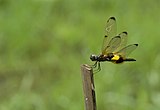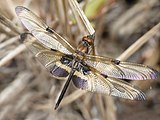Rhyothemis phyllis
Appearance
| Rhyothemis phyllis | |
|---|---|

| |
| Male, Darwin, Northern Territory, Australia | |

| |
| Female | |
| Scientific classification | |
| Domain: | Eukaryota |
| Kingdom: | Animalia |
| Phylum: | Arthropoda |
| Class: | Insecta |
| Order: | Odonata |
| Infraorder: | Anisoptera |
| Family: | Libellulidae |
| Genus: | Rhyothemis |
| Species: | R. phyllis
|
| Binomial name | |
| Rhyothemis phyllis | |

| |
Rhyothemis phyllis, known as the yellow-striped flutterer or yellow-barred flutterer, is a species of dragonfly of the family Libellulidae,[3][4] widespread in South-east Asia, including Cambodia, China, India, Indonesia, Lao People's Democratic Republic, Malaysia, Myanmar, Singapore, Taiwan, Thailand, Vietnam, and northern Australia.
Rhyothemis phyllis is a small to medium-sized dragonfly, commonly found at open ponds or marshes, and swamp forests. Its flight is usually fluttering.
There are two known sub-species in Australia, Rhyothemis phyllis chloe Kirby, 1894 and Rhyothemis phyllis beatricis Lieftinck, 1942.[5]
Gallery
[edit]-
Male Rhyothemis phyllis phyllis
-
Female
-
Male adopting an obelisk posture
-
Male face
-
Wings up - wings down
-
From behind
-
Side view
-
Male teneral, recently emerged
-
Female wings
-
Male wings
See also
[edit]References
[edit]Wikimedia Commons has media related to Rhyothemis phyllis.
Wikispecies has information related to Rhyothemis phyllis.
- ^ Dow, R.A. (2017). "Rhyothemis phyllis". IUCN Red List of Threatened Species. 2017: e.T167448A83383933. doi:10.2305/IUCN.UK.2017-1.RLTS.T167448A83383933.en. Retrieved 20 November 2021.
- ^ Sulzer, J.H. (1776). "Die Wasserjungfer". Dr. Sulzers abgekürzte Geschichte der Insecten nach dem Linnaeischen System (in German). Winterthur : H. Steiner. pp. 166–169 [169]. doi:10.5962/bhl.title.11198 – via Biodiversity Heritage Library.
- ^ Theischinger, Gunther; Hawking, John (2006). The Complete Field Guide to Dragonflies of Australia. Collingwood Vic.: CSIRO. p. 288. ISBN 0643090738.
- ^ "Species Rhyothemis phyllis (Sulzer, 1776)". Australian Faunal Directory. Australian Biological Resources Study. 2012. Retrieved 28 February 2017.
- ^ Atlas of Living Australia











